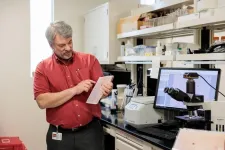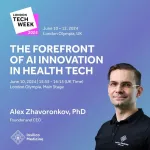(Press-News.org) Alzheimer’s disease is the most common type of dementia, a disorder of progressively worsening memory and other thinking abilities. It rose up in the ranks of leading causes of death over the past several decades. It can also limit the duration of a working career, create uncertainty in the financial planning for retirement and rob patients of enjoyment and happiness in the final years. An effective treatment against this disease could give back to the patient the decision when to retire and improve quality of life in advanced age.
Now, scientists at the Alzheimer’s Center at Temple at the Lewis Katz School of Medicine at Temple University are on the trail of a promising new therapeutic target – ABCA7, a protein known to protect from Alzheimer’s disease. The study, published online in the journal Cells, uncovers new information about the relationship between ABCA7, cholesterol, and inflammation in human brain cells.
The importance of ABCA7 in the development of Alzheimer’s disease first emerged in genome-wide association studies, which are large investigations of the human genome that involve thousands of participants. “But genome studies only point to a protein and do not tell us anything about how it functions or how it affects a disease,” said Joel Wiener, an investigator with the Alzheimer’s Center at Temple and first author on the new report. “Our goal is to reveal ABCA7’s functions and to use what we learn about its role in pathology to turn it into an effective therapy against Alzheimer’s disease.”
Previous work led by Nicholas Lyssenko, Ph.D., an investigator at the Alzheimer’s Center at Temple and corresponding author on the new study, suggested that individuals between ages 63 and 78 who have low ABCA7 protein levels in the brain are at a greater risk of developing Alzheimer’s disease. This finding corroborated the conclusions of earlier genome studies and further indicated that the protein protects the human brain.
In the new study, Dr. Lyssenko’s team addressed how cholesterol metabolism and inflammation may manipulate ABCA7 levels in human brain cells and thus affect Alzheimer’s disease pathogenesis. In one set of experiments, the researchers depleted cholesterol in different neural cell lines, such as microglia, astrocytes and neurons, and then treated the cells with rosuvastatin, a medication that suppresses cholesterol synthesis. To determine the effect of inflammation on ABCA7, the team carried out another set of experiments in which the same cell lines were treated with one of three major proinflammatory cytokines: IL-1β, IL-6, or TNFα. Cytokines are small molecules that can trigger inflammation following their secretion from certain types of immune cells.
The researchers found that ABCA7 levels dropped by about 40 percent in microglia cell lines and about 20 percent in an astrocyte cell line after the cells were depleted of more than half their usual amount of cholesterol. Meanwhile, no changes were observed in ABCA7 levels in a neuronal cell line following cholesterol loss. In addition, IL-1β and TNFα suppressed ABCA7 expression only in microglial cells. The third cytokine, IL-6, had no impact on ABCA7 in microglia, and none of the three cytokines induced changes in ABCA7 levels in either astrocytes or neurons.
These observations advance understanding of how ABCA7 is regulated in the brain. “Our findings suggest that cholesterol loss downregulates ABCA7 in many cells in the human brain. Previous work in mice showed that cholesterol loss upregulates ABCA7,” said Mr. Wiener. “In addition, other investigators found that inflammation suppresses ABCA7 in astrocytes, and we show now that this can also happen in microglia. Overall, cholesterol depletion and inflammation may reduce ABCA7 levels in the brain and cause the onset of Alzheimer’s disease.”
The Temple team is taking multiple approaches to studying ABCA7, using not only human cells but also carrying out experiments in animal models and in postmortem human brain tissue. “The greatest challenge now is to figure out how to measure ABCA7 levels in the brain of living humans,” Dr. Lyssenko added. “If we achieve this, we could verify whether inflammation suppresses ABCA7 in the human body. Effective testing for ABCA7 levels in the brain will also identify individuals who are at greater risk for Alzheimer’s disease and spur the development of new ABCA7-based therapies.”
Other researchers who contributed to the study include Sindy Desire, Viktor Garliyev, Nicholas Lyssenko III, and Domenico Praticò, Alzheimer's Center at Temple, Department of Neural Sciences, Lewis Katz School of Medicine.
The research was supported by funding from the National Institute on Aging at the National Institutes of Health (NIH) and from the Pennsylvania Department of Health, Commonwealth Universal Research Enhancement Program.
About the Lewis Katz School of Medicine
Founded in 1901, the Lewis Katz School of Medicine at Temple University attracts students and faculty committed to advancing individual and population health through culturally competent patient care, research, education, and service. The School confers the MD degree; MS and PhD degrees in Biomedical Science; the MA in Urban Bioethics; the MS in Physician Assistant studies; a certificate in Narrative Medicine; a non-degree post-baccalaureate program; several dual degree programs with other Temple University schools; continuing medical education programs; and in partnership with Temple University Hospital, 40 residency and fellowship programs for physicians. The School also manages a robust portfolio of publicly and privately funded transdisciplinary studies aimed at advancing the prevention, diagnosis, and treatment of disease -- with specialized research centers focused on heart disease, cancer, substance use disorder, metabolic disease, and other regional and national health priorities. To learn more about the Lewis Katz School of Medicine, please visit: medicine.temple.edu.
END
New study at the Alzheimer’s Center at Temple casts light on protein that could help defeat Alzheimer’s disease and increase productive lifespan
2023-10-05
ELSE PRESS RELEASES FROM THIS DATE:
Up-and-coming researchers vie in a 'Shark Tank'-inspired competition during the Ramona Jones Friends of BrainHealth Scientist Selection Luncheon
2023-10-05
On October 2, 2023, Center for BrainHealth, part of The University of Texas at Dallas, held its annual Friends of BrainHealth Scientist Selection Luncheon at the Dallas Country Club. This year was a special one, with Ramona Jones, founding BrainHealth Advisory Board member, kicking off a five-year sponsorship of the luncheon. Her five children made this sponsorship gift in her honor and surprised her with the naming for her 95th birthday in August 2023.
The Friends of BrainHealth donor circle is dedicated to supporting ...
Who will have ‘miracle’ improvement of rheumatoid arthritis during pregnancy?
2023-10-05
Rheumatoid arthritis appears three times more often in women
Women need to know whether they can stop taking drugs while pregnant
Genetic markers could predict who will improve and who will worsen during pregnancy
When women with rheumatoid arthritis (RA) plan to become pregnant, many anguish over whether to stop their medications, risking a flareup in their disease, or continue with medication and risk possible harm to the baby.
About 50% to 75% will see their disease naturally improve during pregnancy for not-yet-known reasons, while others may see a worsening of their RA. But they have had no way of knowing which would happen to them.
Now, Northwestern Medicine scientists ...
Groundbreaking study shows defects spreading through diamond faster than the speed of sound
2023-10-05
Settling a half century of debate, researchers have discovered that tiny linear defects can propagate through a material faster than sound waves do.
These linear defects, or dislocations, are what give metals their strength and workability, but they can also make materials fail catastrophically – which is what happens every time you pop the pull tab on a can of soda.
The fact that they can travel so fast gives scientists a new appreciation of the unusual types of damage they might do to a broad range of materials in extreme conditions – from rock ripped apart ...
AI-driven earthquake forecasting shows promise in trials
2023-10-05
A new attempt to predict earthquakes with the aid of artificial intelligence has raised hopes that the technology could one day be used to limit earthquakes’ impact on lives and economies. Developed by researchers at The University of Texas at Austin, the AI algorithm correctly predicted 70% of earthquakes a week before they happened during a seven-month trial in China.
The AI was trained to detect statistical bumps in real-time seismic data that researchers had paired with previous earthquakes. The outcome was a weekly forecast in which the AI successfully predicted 14 earthquakes within about 200 miles of where it estimated they would happen and at almost exactly the ...
MSU research shows plants could worsen air pollution on a warming planet
2023-10-05
MSU has a satellite uplink/LTN TV studio and Comrex line for radio interviews upon request.
Images
Highlights:
New Michigan State University research published in the journal Proceedings of the National Academy of Sciences shows that plants such as oak and poplar trees will emit more of a compound called isoprene as global temperatures climb.
Isoprene from plants represents the highest flux of hydrocarbons to the atmosphere behind methane.
Although isoprene isn’t inherently bad — it actually helps plants better tolerate insect pests and high temperatures — it can worsen air pollution by reacting ...
Barrow Neurological Institute receives $16.7 million NIH award to help coordinate new national ALS research consortium
2023-10-05
The purpose of the award is to create the Access for All in ALS (ALL ALS) Consortium to conduct clinical research that will include ALS patients nationwide, generating a longitudinal biorepository linked to detailed clinical information that will be made available to research scientists throughout the world using a web-based portal. As part of this new consortium Barrow will manage half of 34 clinical sites in the study which spans the U.S. and Puerto Rico. The consortium will be led by researchers at Barrow, Massachusetts General Hospital and Columbia University.
“Barrow Neurological Institute is honored to be selected by the NIH to help coordinate this ...
How to protect self-esteem when a career goal dies
2023-10-05
Many people fail at achieving their early career dreams. But a new study suggests that those failures don’t have to harm your self-esteem if you think about them in the right way.
Researchers found that people who viewed career goal failures as a steppingstone to new opportunities never lost self-esteem, no matter how many times they failed. But those who thought their failures left them worse off showed a drop-off in how they felt about themselves.
“It’s not how many times you have had to give up. It is how you felt about the failures, and whether you thought they led to something better for you,” ...
Ultrasensitive blood test detects ‘pan-cancer’ biomarker
2023-10-05
Pathology experts engineered an ultrasensitive test capable of detecting a highly specific biomarker found in multiple common cancers
In collaboration with cancer researchers across the country and the globe, the team evaluated the tool’s ability to detect the biomarker in ovarian cancer, gastroesophageal cancer, colon cancer, and other cancers
Diagnostic assays have potential for early cancer detection, monitoring, and prognostics
Marker ‘LINE-1 ORF1p’ is a protein encoded by a human transposon that has further potential applications in tissue diagnostics and may also facilitate treatment of cancers for which no accurate biomarkers ...
Insilico Medicine founder and CEO Alex Zhavoronkov, Ph.D., to present on AI drug discovery at LSX Nordic Congress
2023-10-05
Alex Zhavoronkov, Ph.D., founder and CEO of Insilico Medicine (“Insilico”) will present at the 6th LSX Nordic Conference happening in Copenhagen Oct. 10-11. Zhavoronkov, a leader in generative artificial intelligence (AI) technologies for drug discovery and biomarker development, will present on Oct. 11, 2pm CET on “‘How Artificial Intelligence is Shaping the Future of Drug Discovery, Design, and Development.”
The LSX Nordic Congress is a leading strategy, investment and partnering conference for the Nordic region connecting life science and healthcare ...
Grape consumption benefits eye health in human study of older adults
2023-10-05
In a recent randomized, controlled human study, consuming grapes for 16 weeks improved key markers of eye health in older adults. The study, published in the scientific journal Food & Function looked at the impact of regular consumption of grapes on macular pigment accumulation and other biomarkers of eye health.[1] This is the first human study on this subject, and the results reinforce earlier, preliminary studies where consuming grapes was found to protect retinal structure and function.[2]
Science has shown that an aging population has a higher risk of eye disease and vision problems. Key risk factors for eye disease include 1) oxidative ...




